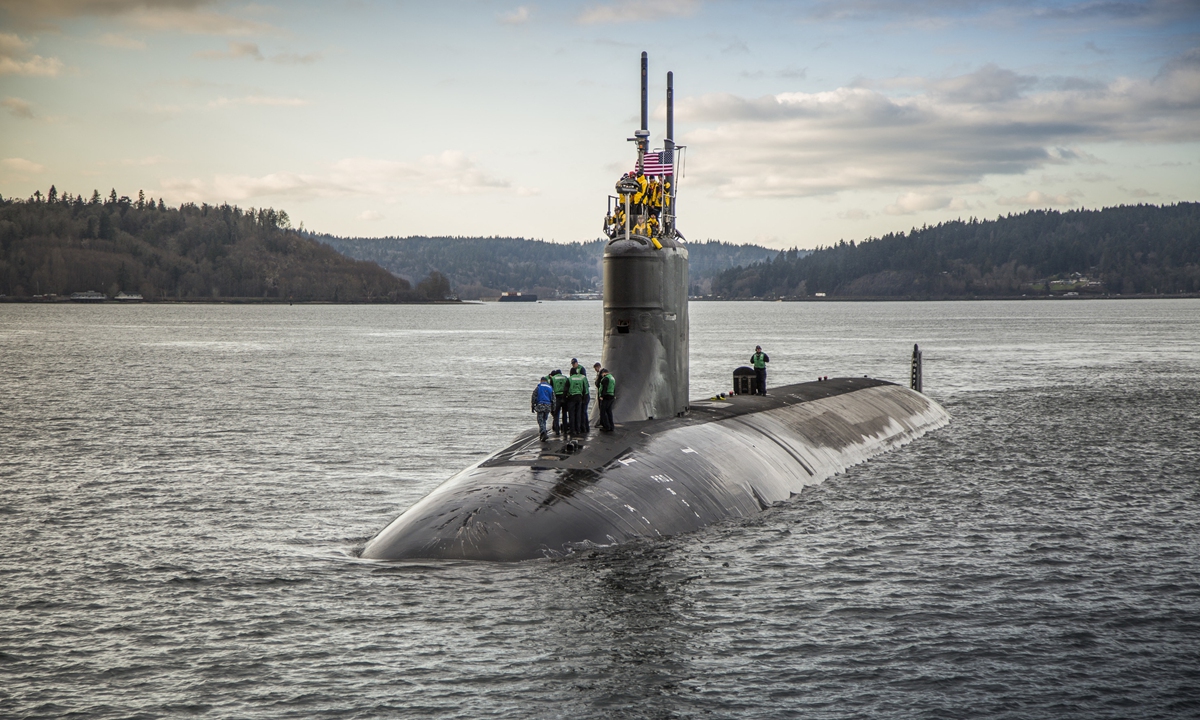风萧萧_Frank
以文会友西方“指责产业”如何针对中国运作?
https://www.globaltimes.cn/page/202110/1236588.shtml
环球时报 2021 年 10 月 18 日
编者注:
一些西方主流媒体从未放弃抹黑中国的企图。 西方国家为何花这么大力气抹黑中国? 他们如何从中受益? 为什么以美国为首的西方不能客观地解读中国? 环球时报记者就这些问题采访了瑞典智库跨国和平与未来研究基金会(TFF)主任简·奥伯格(Oberg)。
GT:TFF发表了一份题为《烟幕背后:西方破坏性的中国冷战议程及其为何必须停止的分析》的报告。 西方媒体的“指责产业”如何针对中国运作?
奥伯格:我们在该报告中提出的是,该议程是由我创造的军事-工业-媒体-学术综合体(MIMAC)制定的。 这一复合体由关系密切的精英组成,他们有共同利益,指定一个又一个国家对美国/北约世界构成威胁。
在危险的程度上,MIMAC 在公开的民主决策之外运作。 与当时的苏联一样,今天的美国也没有 MIMAC。 这个美国本身就是一个MIMAC。 如果没有虚构的敌人形象,MIMAC 及其对纳税人巨额资金的吸收将变得不可能。 它建立在“恐惧学”的基础上——让公民感到恐惧,然后含蓄地接受他们的政府在破坏、武器和战争上花费了大量资金,而不是解决人类的真正问题。
军事实力与和平之间没有关联。 最大的军事强国美国几乎永久处于战争状态并感到受到威胁。 而北约以军事为基础的“安全、稳定与和平”自1949年以来就没有创造过和平。大多数国家都有某种MIMAC。 军国主义——包括核主义——是当今地球上最大的问题。 它是每个帝国衰落的核心指标:军事化导致经济死亡、失去战争和人类尊重。 因此,我们所说的针对中国的指控行业背后的一个主要原因是它使 MIMAC 能够进一步发展,但所有此类社会学现象都有一个顶峰:然后是衰落、衰退和崩溃。
环球时报:既然你提到了军国主义,那么你对美国与英国和澳大利亚最新建立的印太安全联盟AUKUS有何看法? 这是进一步说明“美帝国衰落”的“核心指标”吗?
奥伯格:媒体和大多数人都关注陆地战争,却忘记了世界海洋上正在发生永久的冷战——主要是潜艇和反潜战。
从定义和哲学上来说,联盟是“我们”团体联合起来反对“他们”,因此是对抗性的。 与北约一样,AUKUS 也不例外,当它声明这不是针对中国时,我在冲突分析和缔造和平领域已经有足够长的时间来解释这正是它的本质。
10月2日,美国一艘核武装攻击潜艇在南海击中“不明物体”。 这种事情的危险性是无法用言语来形容的。 得益于先进的水下监视,华盛顿当然知道那个物体是什么以及它发生的原因。
西方媒体没有对这一重大事件进行任何调查,却把更多的精力花在了布兰妮身上! 一个简单的问题:如果中国潜艇击中加州或佛罗里达州以外的地方,美国会如何反应,媒体会如何炸毁它?
总的来说,这是一场不对称的冲突,没有人问:美国、英国、澳大利亚等在地球上——或者更确切地说在海上——在那里做什么? 可以理解的是,中国想知道。 但全人类都有知情权,但我们只了解了冰山一角。
还记得 1981 年在瑞典的苏联“威士忌威士忌”潜艇吗? 后来有记载称,这是美国与少数瑞典军人勾结的一次心理行动。
如果美国声称它确保了世界海洋的自由通行,我们就不应该允许它这么做。 相反,我们应该建立一支联合国海上维和部队,在各地巡逻,尊重国际法,降低风险,服务于联合国和人类的利益,而不仅仅是美国的利益。
环球时报:TFF今年5月发表了一份题为《将新疆种族灭绝确定为议程》的报告。 西方媒体和机构为了宣扬新疆发生“种族灭绝”,利用反华人士,给他们编造“受害者”身份。 你对此有什么看法?
奥伯格:在那份报告中,我们没有分析单个证人或其身份。 我们逐条表明,一系列西方学者和非政府组织的分析和记录在很大程度上不符合合格的社会研究的要求。 它们建立在估计、奇怪的方法、可疑的数据、片面的观点和有偏见的解释的基础上。 它们是委托工作,而不是免费研究。
这尤其适用于新线研究所的报告。 就在同一天,许多西方主流媒体都强调了这一点——这些媒体的记者不做检查消息来源的基本工作,而显然只阅读摘要——以保持政治正确。
自美国前国务卿蓬佩奥“认定”新疆涉及种族灭绝以来,美国尚未提供任何证据。 新疆为遏制暴力分裂分子所采取的行动不是我们报告的对象,因为我们不是人权组织,也没有实地考察过。
我把报道发给了20多家曾经报道过新疆的重要媒体人士,指出了严重的来源和方法论问题。 没有人回应。 此外,尽管有几千家西方媒体收到了我们的新闻稿,但没有任何西方媒体接受 TFF 的两份报道。
所以MIMAC的策略就是沉默。 可悲的是,新闻自由也包括无知的自由和只宣扬一种政治正确但往往是错误的叙述的自由。
环球时报:您在最近的采访中提到,美国将在未来5年内拨款15亿美元,培训西方媒体专门撰写对华负面报道。 美国为何投入如此巨资抹黑中国? 美国如何从中受益?
奥伯格:如果一个政府想通过对抗、冷战或热战来满足其贪得无厌的MIMAC,就必须抹黑、妖魔化和指责他人。 其基本理念是“我们是全世界的榜样,他们很糟糕,因为他们不像我们。你要么与我们站在一起,要么与我们的敌人站在一起。”
西方传教士思想一直是这样的,深深植根于我们/他们、非此即彼、善/恶的二分法哲学。 现实——用平庸的话说——所有的系统都有好的一面,也有不好的一面。
上述法律令人难以置信,因为它完全损害了西方对自由媒体、言论自由、报道不同立场的公平性等的自豪感。
多年来我一直认为,美国/北约世界的真正敌人不是俄罗斯、中国、伊朗或其他任何人,而是美国/北约世界本身:它的军国主义、缺乏远见、领导力和自我创新。 如果美国和西方内部没有发生根本性的改变,这种情况就无法再继续下去了。
马丁·路德·金几十年前就说过:“美国,你变得太傲慢了。” 如果一个国家排名第一,它往往不会学习,而是会教导、掌握并抛弃谦逊。
如果我们选择多样性中的合作与团结,而不是永久的对抗和主导,整个世界将会获得巨大的收获和发展。 但我认真地想知道,西方是否可以在没有不断察觉敌人的情况下生存?
环球时报:西方媒体炮制错误信息和假新闻抹黑中国。 它们能在多大程度上迷惑国际社会?如何抵消这种负面影响?
奥伯格:是的,主流媒体这样做是因为他们是 MIMAC 的组成部分。 我认为他们确实让很大一部分公民感到困惑。 但正如一句广为流传的名言所说,“你可以在某些时候欺骗所有人,也可以在所有时间欺骗某些人,但你不可能在所有时间欺骗所有人。”
虽然我在职业和私人生活中遇到很多人受到有关中国的十个标准负面故事的影响,但人们的看法正在变得更加平衡。 我相信,这就是为什么受国家影响的媒体因恐慌而损失 15 亿美元的原因。
这是短视的——正如大多数心理战尝试一样。 独立的思想会审视它,而新媒体——例如好书、博客和视频博客——塑造了媒体场景。 人们会发现自己被愚弄了。
打击这些心理战的一种方法是让数百万外国游客、学生、专业人士和文化工作者进入中国。无知、仇华观点和从未访问过(或研究过)中国之间以及更平衡的观点之间存在高度相关性 并曾访问或研究过中国。
我坚信为合作与和平而“搭建公民桥梁”——就像中国对“一带一路”倡议所做的那样。 我们必须而且能够减少战争风险。 当我们想要和平时,让我们为和平做好准备。
How does Western 'accusation industry' operate against China?
https://www.globaltimes.cn/page/202110/1236588.shtml
By Global Times Oct 18, 2021

File photo of USS Connecticut Photo: AFP
Editor's Note:Some mainstream Western media outlets have never given up their attempts to smear China. Why do Western countries invest so much effort to smear China? How can they benefit from it? Why can't the US-led West read China objectively? Global Times (GT) reporter talked to Jan Oberg (Oberg), director of Sweden-based think tank Transnational Foundation for Peace and Future Research (TFF), on these issues.
GT: The TFF published a report titled, "Behind the Smokescreen: An Analysis of the West's Destructive China Cold War Agenda and Why it Must Stop." How does the Western media's "accusation industry" operate against China?
Oberg: What we present in that report is that this agenda is produced by what I have coined the Military-Industrial-Media-Academic Complex (MIMAC). This Complex consists of tightly connected elites with a common interest in appointing one country after another as a threat to the US/NATO world.
To a dangerous extent, MIMAC operates outside open democratic decision-making. Like the Soviet Union back then, the US today does not have a MIMAC. This US itself is a MIMAC. Without invented images of enemies, the MIMAC and its absorption of grotesquely huge taxpayer money sums would become impossible. It builds on "fearology" - on making citizens fear and then implicitly accept that their governments spend so much on destruction, weapons and wars instead of on solving humanity's real problems.
There is no correlation between military strength and peace. The largest military power, the US, is almost permanently at war and feels threatened. And NATO's military-based "security, stability and peace" has created no peace since 1949. Most countries have some kind of MIMAC. Militarism - including Nuclearism - is the single largest problem on today's Earth. And it is a central indicator of every Empire's decline: militarizing itself to economic death, losing its wars and humanity's respect. So a major reason behind the mentioned accusation industry, as we call it, against China is that it enables the MIMAC to grow even more, but there is a peak point for all such sociological phenomenon: Then come decline, decay and fall.
GT: Since you've mentioned militarism, what is your opinion about the US' latest Indo-Pacific security alliance with the UK and Australia, AUKUS? Is it a "central indicator" further illustrating the "US empire's decline"?
Oberg: The media and most people focus on land warfare while forgetting that a permanent Cold War takes place in the world's oceans - predominantly by submarine and anti-submarine warfare.
Alliances are, by definition and philosophically, "we" groups that ally against "them" and, therefore, confrontational. Like NATO, AUKUS is no exception and when it is stated that this is not directed against China, I've been long enough in the conflict analysis and peace-making profession to interpret that that is exactly what it is.
On October 2, a US nuclear-armed attack submarine hit some "unidentified object" in the South China Sea. This sort of thing is dangerous beyond words. Thanks to sophisticated underwater surveillance, Washington of course knows what that object was and why it happened.
The Western media have done nothing to investigate this hugely important event but spent more energy on Britney Spears! A simple question: How would the US react if a Chinese submarine hit something outside California or Florida, and how would the media have blown it up?
In general, this is an asymmetric conflict and nobody asks: What on earth - or rather on sea - does the US, the UK, Australia, etc, do over there? Understandably, China wants to know. But all humanity has a right to know but we only get the top of the iceberg.
Remember the Soviet "Whisky On The Rocks" submarine in Sweden in 1981? It has later been documented that it was a Psychological Operation orchestrated by the US in cahoots with a handful of Swedish military people.
If the US argues that it secures free passage on the world's oceans, we should not let it. Instead, we should establish a UN Maritime Peace-Keeping Force to patrol everywhere, respect international law, reduce risks and serve the United Nations' - humanity's - interest and not only those of the US.

Jan Oberg Photo: Courtesy of Oberg
GT: The TFF published a report titled, "The Xinjiang Genocide Determination as Agenda" in May. To declare the "genocide" in Xinjiang, Western media and institutions have taken advantage of anti-China activists and given them fake identities as "victims." What is your take on this?
Oberg: In that report, we do not analyze the single witnesses or their identities. We show, point-by-point, that the analyses and documentation by a series of Western scholars and NGOs largely do not hold water as qualified social studies. They build on estimates, strange methodology, dubious data, one-sided perspectives and biased interpretations. They are commissioned work, not free research.
This applies in particular to a report from the Newline Institute. On one and the same day, it was highlighted by lots of Western mainstream media - whose journalists don't do their basic job of checking sources but evidently read only summaries - to keep politically correct.
The US has not delivered any evidence since former US secretary of state Mike Pompeo's "determination" that Xinjiang is about a genocide. What has been done in Xinjiang to contain violence-based secessionists was not the object of our report since we are not a human rights organization and have not been on the ground.
I sent our report to more than 20 important media people who had written about Xinjiang and pointed out the serious source and methodology problems. Not one responded. Further, no Western media has taken up TFF's two reports - although a couple of thousand receive our press releases.
So the MIMAC strategy is silence. Sadly, the free press includes also the freedom to be ignorant and promote only one politically correct - but often false - narrative.
GT: In a recent interview, you mentioned that the US sets off $1.5 billion in the next 5 years to train Western media to write exclusively negative reports about China. Why has the US invested so much in smearing China? How can the US benefit from it?
Oberg: If a government wants to satisfy its insatiable MIMAC by confrontation and cold or hot war, it has to smear, demonize and accuse others. The underlying philosophy is that "We are the model for the whole world and they are bad because they are not like us. You are either with us or with our enemies."
Western missionary thinking has always been about that, deeply rooted in a dichotomizing we/them, either/or and good/evil philosophy. Reality - to state the banal - is that there is something good and something not so good in all systems.
The mentioned law is mind-boggling because it totally undermines the West's own pride in free media, freedom of expression, fairness in reporting different standpoints etc.
I've argued for years that the real enemy of the US/NATO world is neither Russia, China, Iran or anyone else but that US/NATO world itself: its militarism, lack of vision, leadership and self-innovation. It just cannot go on any longer without fundamental change from inside the US and West.
Martin Luther King Jr. said it decades ago: "America, you have become too arrogant." If a country is No.1, it often doesn't learn, it teaches, masters and discards humility.
The whole world would gain and grow tremendously if we chose cooperation and unity in diversity instead of permanent confrontation and dominance. But I seriously wonder whether the Occident can live without perceiving enemies constantly?
GT: Western media have concocted misinformation and fake news to smear China. To what extent can they confuse the international community and how to offset such a negative impact?
Oberg: Yes, the mainstream media do that because they are one element of the MIMAC. I think they do confuse a large part of the citizenry. But as a wide-spread quote said, "You can fool all the people some of the time and some of the people all the time, but you cannot fool all the people all the time."
While I meet lots of people in my professional and private life who are influenced by the 10 standard negative stories about China, perceptions are changing towards more balance. That's what explains, I believe, the panic-driven $1.5 billion for state-influenced media.
It's short-sighted - as are most attempts at PSYOPs, Psychological Operations. Independent minds look through it and new media - such as good books, blogs and Vlogs - shape the media scene. People will find out that they were fooled.
One way of combating these PSYOPs would be for China to have millions of foreign tourists, students, professionals and cultural workers come in. There is a high correlation between ignorance, Sinophobic views and never having visited (or studied) China and between more balanced views of China and having visited or studied it.
I believe strongly in "citizens bridge building" for cooperation and peace - as China does with the Belt and Road Initiative. We must and can reduce the risk of warfare. Let's prepare for peace when that's what we want.




